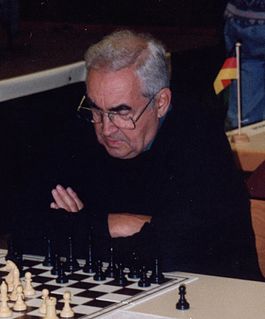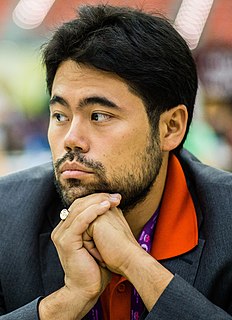A Quote by John Nunn
While it is a cause for regret that Fischer did not continue to produce scintillating games, he perhaps had a greater impact on chess than any other twentieth century player
Related Quotes
I used to play a lot of chess and competitive chess and study chess and as you get to the grandmasters and learn their styles when you start copying their games like the way they express themselves through... The way Kasparov or Bobby Fischer expresses themselves through a game of chess is it's astonishing. You can show a chess master one of their games and they'll say "Yeah, that is done by that player."
Film is more than the twentieth-century art. It's another part of the twentieth-century mind. It's the world seen from inside. We've come to a certain point in the history of film. If a thing can be filmed, the film is implied in the thing itself. This is where we are. The twentieth century is on film. You have to ask yourself if there's anything about us more important than the fact that we're constantly on film, constantly watching ourselves.
Fischer was a good kid but very unsophisticated about anything but chess. It was all chess for him, every waking moment. We'd go down to the Four Continents bookstore and he'd buy any Russian chess material he could get his hands on. He'd learned enough Russian to get the gist of prose and he just absorbed the chess part.
When Grand Masters play, they see the logic of their opponent's moves. One's moves may be so powerful that the other may not be able to stop him, but the plan behind the moves will be clear. Not so with Fischer. His moves did not make sense - at least to all the rest of us they didn't. We were playing chess, Fischer was playing something else, call it what you will. Naturally, there would come a time when we finally would understand what those moves had been about. But by then it was too late. We were dead.
A knowledge of tactics is the foundation of positional play. This is a rule which has stood its test in chess history and one which we cannot impress forcibly enough upon the young chess player. A beginner should avoid Queen's Gambit and French Defence and play open games instead! While he may not win as many games at first, he will in the long run be amply compensated by acquiring a thorough knowledge of the game
Chess, which exists predominantly in two dimensions, is one of the world's most difficult games. Three-dimensional chess is an invitation to insanity. But human relationships, even of the simplest order, are like a kind of four-dimensional chess, a game whose pieces and positions change subtly and inexorably between moves, whose players stare dumbly while their powerful positions deteriorate into hopeless predicaments and while improbable combinations suddenly become inevitable. To make matters worse, some games are open to any number of players, and all sides are expected to win.





































